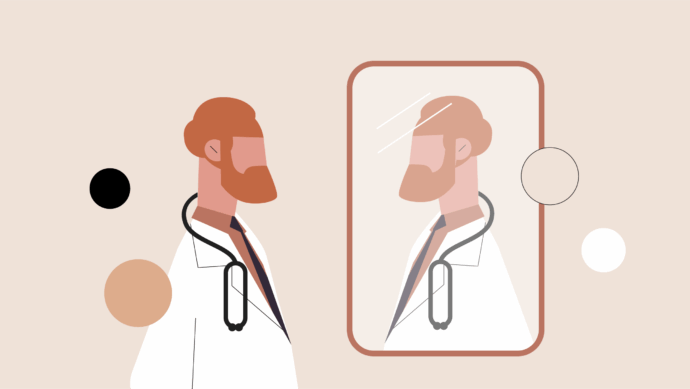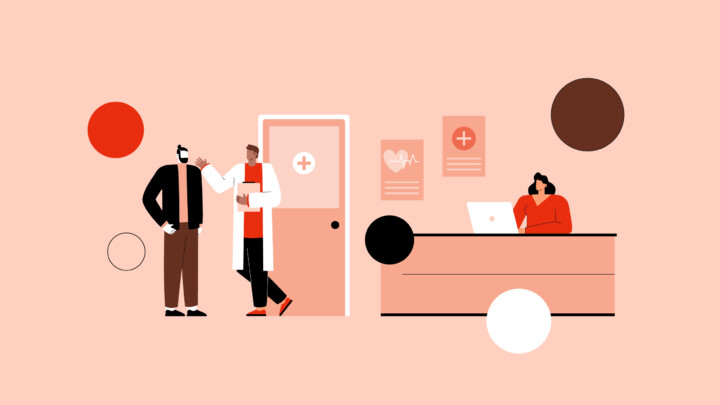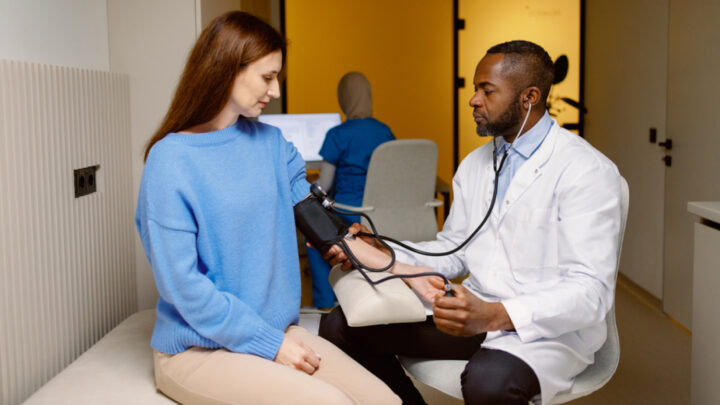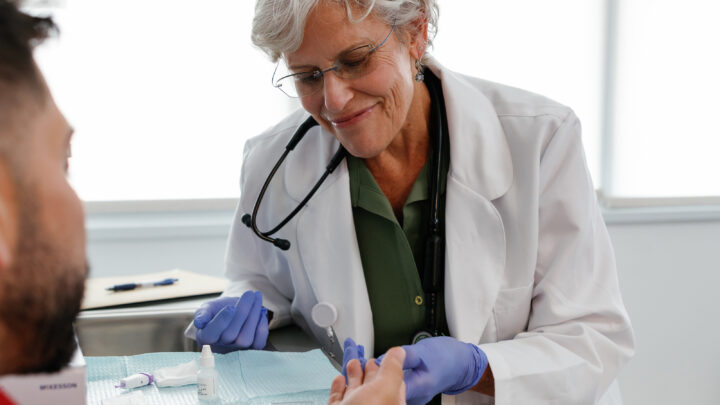
According to a recent Sermo poll, 85% of physicians say they reflect on the quality of care they provide either “frequently” or “all the time.1” Yet 48% report being only “somewhat” satisfied with that care.1 The gap between these two numbers reveals something deeper than performance metrics: a profession caught between high personal standards and difficult working conditions.
So what’s happening in that gap?
Physicians are reflecting, often daily, but they’re doing so in systems that don’t always make space for change.1 Self-reflection is a habit rooted in growth and accountability,2 but when time, support, or energy run low, it risks becoming an internal coping mechanism rather than a lever for improvement.
This article explores what that gap means: Why do physicians reflect so often, even when it’s hard? What impact does self-awareness in healthcare have on care quality, connection and resilience? And what do physicians believe needs to shift in order to make reflective practice a shared professional standard?
What is reflective practice in healthcare? And why is self-reflection important for doctors?
Reflection is the process of examining your experiences in order to gain insight and improve future actions.2 Clinical reflection examples include regularly reviewing decisions, outcomes and interactions to ensure that care stays aligned with clinical standards and personal values.
How does self-reflection improve patient care? According to the UK’s Health and Care Professions Council, reflection supports continual improvement and is a familiar, routine part of professional life.2
Examples of reflection in medical practice
Among physicians on Sermo, reflective practice shows up in many ways, from case reviews to informal self-questioning during a busy clinic day. For some, it’s driven by adverse outcomes. For others, it’s a daily habit. What unites these perspectives is the belief that reflection plays a vital role in safe, high-quality care.1
Physicians use it to sharpen their clinical judgment. A General Surgeon shared on Sermo, “I reflect on the quality of care I provide to patients… What could have gone wrong? What lessons can I learn?3” For many, this kind of thinking happens even without formal prompts. As one Internist noted, reflection helps assess both actions and relationships with patients.3
It’s also a key part of managing burnout. One Orthopedic Surgeon described it as a way to step back and protect well-being: “Self-reflection isn’t just about assessing how we care for others but also about caring for ourselves.3” Another physician added that burnout often blocks good care and reflection can help identify when that risk is rising.3
Importantly, reflection strengthens empathy. In a Sermo poll, 53% of physicians said they’re able to make a solid connection with patients.1 Another 38% said they do “somewhat.1” These numbers hint at room for improvement and reflection may be one path forward.
Self-reflection pushes physicians to consider how care is experienced, not just delivered. “Self-reflection is a way to assure I’m giving my patients the care they deserve,3” shared an Internal Medicine doctor on Sermo. “It helps me be more mindful in every interaction.” Another described each patient encounter as a chance to treat someone as they’d treat family.3
Many also use reflection to process the gap between what they can do and what they wish they could.3 Whether constrained by 10-minute appointments or heavy caseloads, reflection helps clarify the influence of external pressures. “Time is really restricting,3” said one GP on Sermo, despite wanting to self-reflect more.
Above all, reflection is a professional skill that matures with use and with support. One physician said, “It must be practiced and passed on to future generations.3” Making space for it isn’t a luxury. It’s part of what keeps healthcare human.
How many doctors reflect and how often?
Despite the demands of the job, physicians aren’t ignoring the value of reflection. Far from it. According to Sermo poll data, 38% reflect “all the time” and another 47% say they do so “frequently.1” These are not small numbers. They suggest a profession deeply invested in quality and improvement.
But there’s a caveat, because much of this reflection is happening under pressure. Physicians are fitting it into the cracks of their day, often carrying the weight of unanswered questions with them long after hours. As one Ophthalmologist explained, “Sometimes when the schedule is too full, I fear I’m not giving the quality care I want to, but I always reflect and try to improve.3”
This insight reveals something important. Reflection isn’t lacking in motivation, but rather lacking in support. The will is there. The space often isn’t.
What are the barriers to reflective practice for doctors?
While many physicians recognize the value of reflective practice, making time for it isn’t always straightforward. When surveyed, Sermo respondents identified several major obstacles that get in the way of meaningful reflection; many of which are systemic, not personal.
Burnout was cited by 16% of physicians as a key barrier.1 This isn’t surprising given the emotional toll of modern medicine. As one GP explained, “Burnout and poor staff welfare support… having to see large numbers of patients daily with minimal support impedes my performance and can compromise proper patient care.3” For others, burnout erodes the space for any kind of mental pause. “Burnout very often prevents us from providing quality care,3” added another GP. When simply getting through the day is the goal, there’s little room left for reflection.
A larger group, 24%, pointed to a lack of organizational support.1 Long hours, understaffed teams and reactive scheduling mean there’s often no structural space for physicians to pause and assess their practice. “In the daily practice of a doctor, it’s difficult to find time and space to reflect,3” said one GP, “Long hours, multiple patients, critical decisions, in a high-pressure environment.3” These conditions are compounded by patient volumes that make quality care harder to sustain. “The public institution… increases the number of patients we’ve to see every 15 minutes,3” added one Family Medicine physician. “Many patients do not have good control or achieve the goals they had set.3”
This pressure isn’t isolated. In the same poll, 74% of physicians said they feel their organization “sometimes” or “constantly” pushes them to see more patients than they can reasonably care for.1 The result is reduced time with each patient and the erosion of the space needed to think clearly and grow.
Insurance systems were flagged by 17%, with many doctors feeling constrained by financially driven policies that interfere with clinical autonomy.1 “Increased financial pressure is definitely one major contributor to the diminishing quality of patient care,3” said an Internal Medicine doctor. Another physician, frustrated by bureaucracy, put it bluntly: “We need to eliminate every bean-counter in healthcare… they provide absolutely ZERO benefit to patient care.3”
Finally, 30% cited time itself.1 “Appointments are 10 minutes… sometimes you are presented with two problems,3” noted a GP. Others simply said, “There is never enough time.3”
Yet, for 11%, these barriers aren’t an issue.1 Those in solo or private practice, like one Psychiatrist and one Family Medicine physician, reported smoother experiences, more autonomy and less burnout,3 suggesting that structure and control may be the most overlooked supports for reflection.
How can self-reflection become sustainable?
If self-reflection is so valued, what’s missing? According to physicians on Sermo, it’s not insight or interest but rather infrastructure.
Reflection requires protected time, cultural support and a shift in how healthcare organizations define “productive” time.3 That might mean building reflection into team debriefs, creating mentoring spaces, or formally recognizing it as part of continuing professional development.
One Family Medicine doctor summarized the challenge this way: “We’re too few for too many patients. The care we provide is far from what would be optimal.3” That shortage is a barrier to the kind of thoughtful care that physicians want to give.
Reflection can’t be an afterthought or an add-on. If systems want better outcomes, fewer errors and more engaged staff, then reflective space needs to be part of the workday, not squeezed in after it.
Your takeaway
Self-reflection is widely practiced by physicians, with 85% doing it frequently. Yet, nearly half remain only somewhat satisfied with the care they provide.
This gap reveals a profession forced to reflect without enough time, support, or resources to act.
To turn reflection into impact, healthcare systems must stop treating it as extra and start embedding it into the fabric of everyday clinical life.
Join the conversation on Sermo
Thousands of physicians are already reflecting, sharing, and shaping the future of care on Sermo. If you want space to explore what’s working, what’s not, and what needs to change, alongside peers who understand the pressures you face, this is your community.
Join Sermo today and be part of the conversations that are shaping the future of healthcare.
Footnotes
- Sermo (2024) Poll of the Week: Self-Reflection. Available at: https://app.sermo.com/feed/for-you/post/1366058/expanded (Accessed: 15 May 2025).
- Health and Care Professions Council (HCPC) (2019) Benefits of becoming a reflective practitioner: A joint statement of support from Chief Executives of statutory regulators of health and care professionals. Available at: https://www.hcpc-uk.org/globalassets/news-and-events/benefits-of-becoming-a-reflective-practitioner—-joint-statement-2019.pdf (Accessed: 15 May 2025)
- Sermo member comment on: Sermo (2024) Poll of the Week: Self-Reflection. Available at: https://app.sermo.com/feed/for-you/post/1366058/expanded (Accessed: 15 May 2025)















